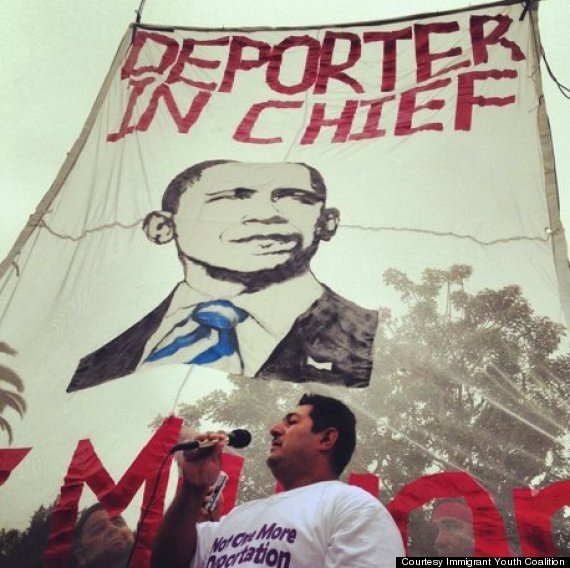There is an expression in Spanish, Dime quienes son tus amigos y te diré quien eres, or "Tell me who your friends are, and I'll tell you who you are."
But what happens when you are out of sync with your friends?
Maybe it's time to start listening to them. Last week, President Obama got an earful from his immigration allies. The head of a top Latino advocacy group called him the "Deporter-in-Chief," while leading Democrats pressed him to take executive action on immigration. No wonder a headline in Politico read "Barack Obama under siege over deportations."
The pressure on the president over immigration is unprecedented because it is coming from the left, and also because it is well-deserved. Obama's unfortunate immigration legacy is little more than broken promises and broken families. It is time for him to do the right thing and ease up on deportations.
At a recent Washington DC gala, National Council of La Raza (NCLR) President Janet Murguia tagged Obama with the "Deporter" label and said his immigration enforcement policy "leaves behind it a wake of devastation for families across America." NCLR's break with the White House is significant. The largest Hispanic civil rights and advocacy group in the country, NCLR has been broadly supportive of Obama's agenda, on everything from immigration reform to the Affordable Care Act to the push for a higher minimum wage.
NCLR is frustrated with the Obama administration's record level of deportations, which are on track to hit 2 million this year. Immigration and Customs Enforcement currently deports roughly 1000 people a day, and many of these deportations are for low-level offenses (such as misdemeanors) and non-violent crimes.
NCLR is not alone in its disappointment with the president. On Tuesday, Senator Bob Menendez (D-N.J.) said, "The current deportation apparatus is an outrage, and it's a tragedy." On Wednesday Sen. Dick Durbin (D-Ill.) told reporters that he is urging Department of Homeland Security Jeh Johnson to reduce deportations. Rep. Luis Gutierrez (D-Ill.) noted that, "President Obama has detained more immigrants in jails, prisons, and detention facilities than any other president." These are all amigos of the president. Is he going to listen to them -- or ignore them?
On immigration, the president needs fellow Democrats on his side. Republicans have shown again and again that they prefer to do nothing on the issue. By not acting on deportations, Obama plays into the Republican plan to let reform die a slow death.
So far, Obama is sticking to the idea that he cannot act on his own. At a Town Hall meeting last week, the president said, "I cannot ignore these (immigration) laws anymore than I can ignore any of the other laws that are on the books." Yet Obama said virtually the same thing until he announced the Deferred Action for Childhood Arrivals (DACA) program in June 2012. DACA allows young people who were brought to the U.S. illegally as children to live and work legally. Already, over half a million young immigrants have successfully received its protection.
In fact, the president has authority to take action on deportations. He could expand DACA, to include other discrete classes of people such as low-level offenders and those with long-standing ties to the U.S. He could end the controversial Secure Communities program, which sends fingerprints of people in local and state jails to immigration authorities. He could end Operation Streamline, which often violates the due process of undocumented immigrants. He could make it easier for people to apply for asylum or Temporary Protected Status.
Moreover, there is no doubt about the legality of executive action on immigration. In 2010, a leaked memo from U.S. Citizenship and Immigration Services revealed that the agency was exploring "meaningful immigration reform absent legislative action." According to 2013 report by the Congressional Research Service, "Courts have historically not required that the executive branch have specific statutory authorization for particular exercises of prosecutorial discretion."
Yes, the president has taken measures to help immigrants, such as announcing that undocumented relatives of active U.S. military troops and veterans can stay in the country and apply for permanent residency. Still, the number of people affected by this new policy pales beside the number of removals. Consider that the Obama administration has deported about the same number of people that the U.S. removed between 1892 and 1997. Or that the anger over deportations is not going away. Remember back in November, when a heckler interrupted the president during a speech in San Francisco, demanding an end to all deportations? That type of outburst is becoming commonplace. On Wednesday, Obama was heckled by an immigrant during a visit to Central Connecticut State University. On Friday, DREAMers and their families picketed his speech in Miami. Until the president takes action on immigration, he can count on facing such protests at his public appearances.
If the president believes that immigration reform is achievable through Congress, he should stop deporting so many people who otherwise would be able to apply for a path to citizenship. If does not believe that reform is achievable through Congress, he should take matters into his own hands through executive action. Either way, President Obama should heed the advice of his supporters, decrease deportations, and show the Latino community that he is indeed our friend.

